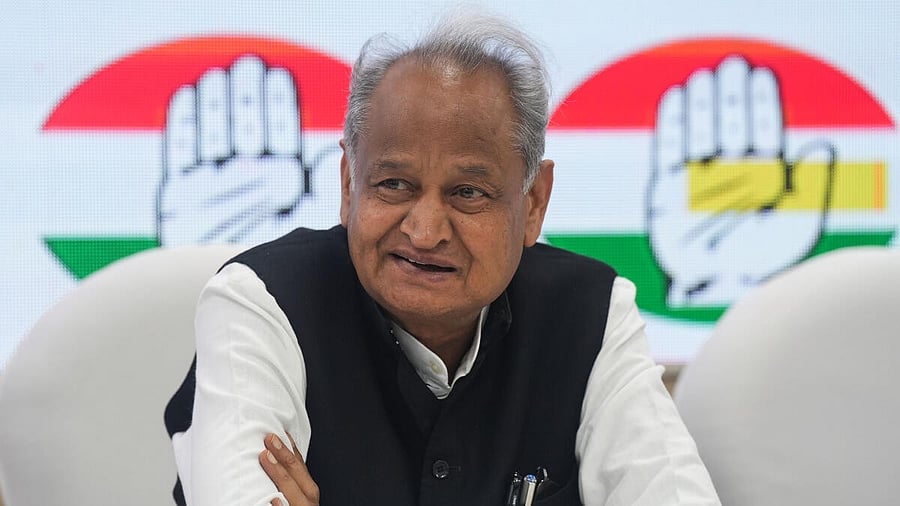
Incumbent Rajasthan CM Ashok Gehlot.
Credit: PTI Photo
The Rajasthan assembly poll was billed as Chief Minister Ashok Gehlot’s last hurrah. But the voters in the desert state denied him the chance of creating history, and instead went with its three-decade-old tradition of voting out an incumbent government. As a result, the Bharatiya Janata Party (BJP) went past the halfway mark in the 200-member assembly while the Congress managed to win a respectable number of seats.
Though Gehlot ran an energetic campaign centring on the various welfare schemes his government rolled out for different sections, including farmers, women, tribals, and the youth, he could not match Prime Minister Narendra Modi’s charisma or counter the BJP’s aggressive religious polarisation.
The BJP took a big risk when it sidelined Vasundhara Raje and decided not to project a chief ministerial face this time, though it was feared she may play spoiler. But the BJP realised her limitations in taking on the party as she could not risk jeopardising her son Dushyant Singh’s political career.
The BJP went in for ‘collective leadership’, sending out a clear message that the party has a host of leaders who can be entrusted with heading the state government. These leaders were kept in the background while it was Modi who led from the front. Just as the Congress campaign was centred on Gehlot, who appeared confident of winning a second term, the BJP depended heavily on Modi’s popularity to overcome other shortcomings. The gamble paid off.
The BJP’s victory in Rajasthan can also be credited to its communal campaign as its leaders, including Modi, periodically accused the Congress of minority appeasement, and raised the spectre of the Hindus being marginalised if the grand old party was returned to power. Modi spoke of the beheading of Udaipur-based tailor Kanhaiyalal for his alleged derogatory references to the Prophet and other instances of the Congress meting out stepmotherly treatment to the Hindus.
Taking a cue from Modi, other BJP campaigners followed suit by peppering their speeches with references to the increasing cases of communal tension in the state, and how the Hindus could not celebrate religious festivals like Hanuman Jayanti. On the ground, it was not unusual to hear people talking about the construction of the Ram Temple at Ayodhya and the abolition of Article 370 in Kashmir while cries of Jai Shri Ram were often heard on the campaign trail.
All this was aided by the BJP’s effective communications strategy, its micromanagement of the elections, and the party's strong organisational presence which were all put to effective use in the campaign.
Gehlot, on the other hand, was banking on his popularity, the fact that there was no overt anti-incumbency against his government and the welfare schemes implemented by his government. But there was anger against individual MLAs who, it was felt, had been inaccessible and had failed to deliver on their electoral promises. Congress’ strategists had suggested that a large number of such legislators be dropped but the party ended up giving tickets to 97 sitting MLAs as it feared it could have a rebellion on its hands on election-eve.
This election was also meant to be a litmus test for Rahul Gandhi’s outreach to the Other Backward Classes (OBCs) with the promise of a nationwide caste census. But this was barely a factor during the campaign as neither other Congress leaders nor the people were talking about it, even though Gehlot is an OBC.
So, what does the Rajasthan verdict mean for Gehlot and Raje, both in their seventies? This was their last shot at power, but it appears that this could well mark the end of their political careers; though Gehlot can draw solace from the fact that unlike the previous elections when an incumbent Congress was reduced to 20-odd seats, the party has notched up a respectable score of about 69 seats this time.
Gehlot may be accommodated in the Congress Working Committee though his rebellion against the party leadership could go against him. The Congress will now have to go in for a generational change and promote a younger leader in the state. Sachin Pilot could emerge as a beneficiary, but it doesn't mean much as he must contend with a seat in the opposition benches for the next five years.
Raje could have been considered for the chief ministerial post if the BJP had hovered around the halfway mark, as she would have succeeded in bringing the rebels and independent candidates on board in forming a government. But now that the BJP is comfortably placed with around 115 seats, the party's central leadership can pick a chief minister of its choice who will be beholden to it for this ‘gift’.
The big question is: who will be the lucky one to get the crown?
(Anita Katyal is a Delhi-based journalist.)
Disclaimer: The views expressed above are the author's own. They do not necessarily reflect the views of DH.